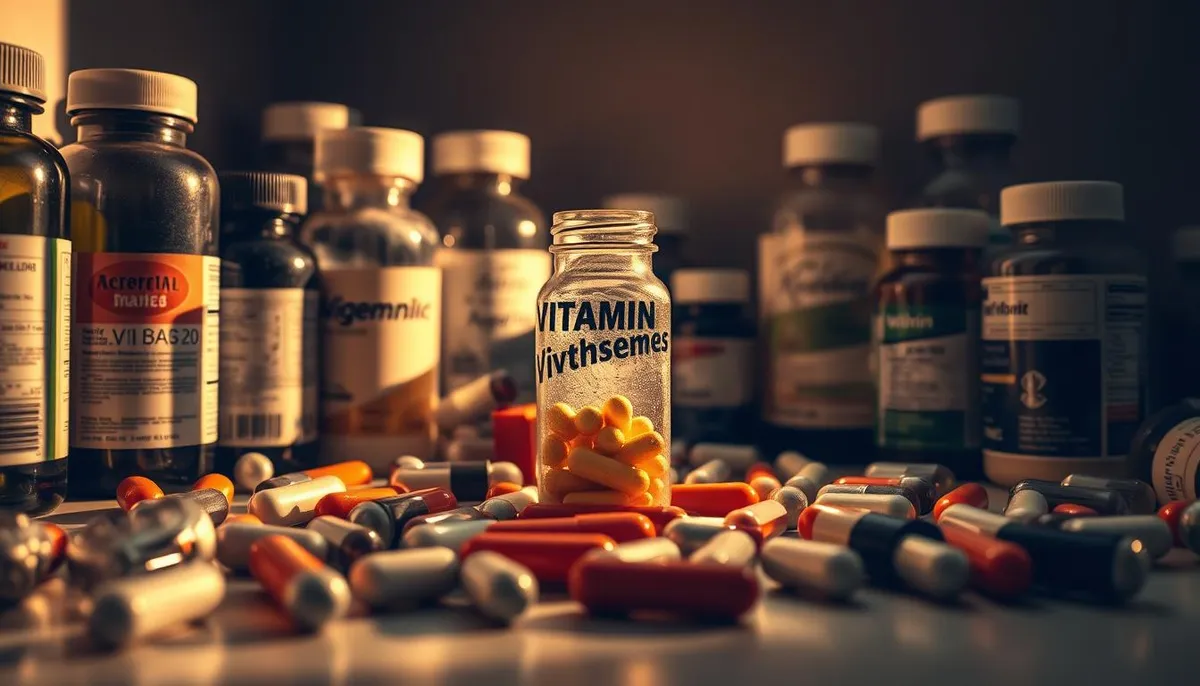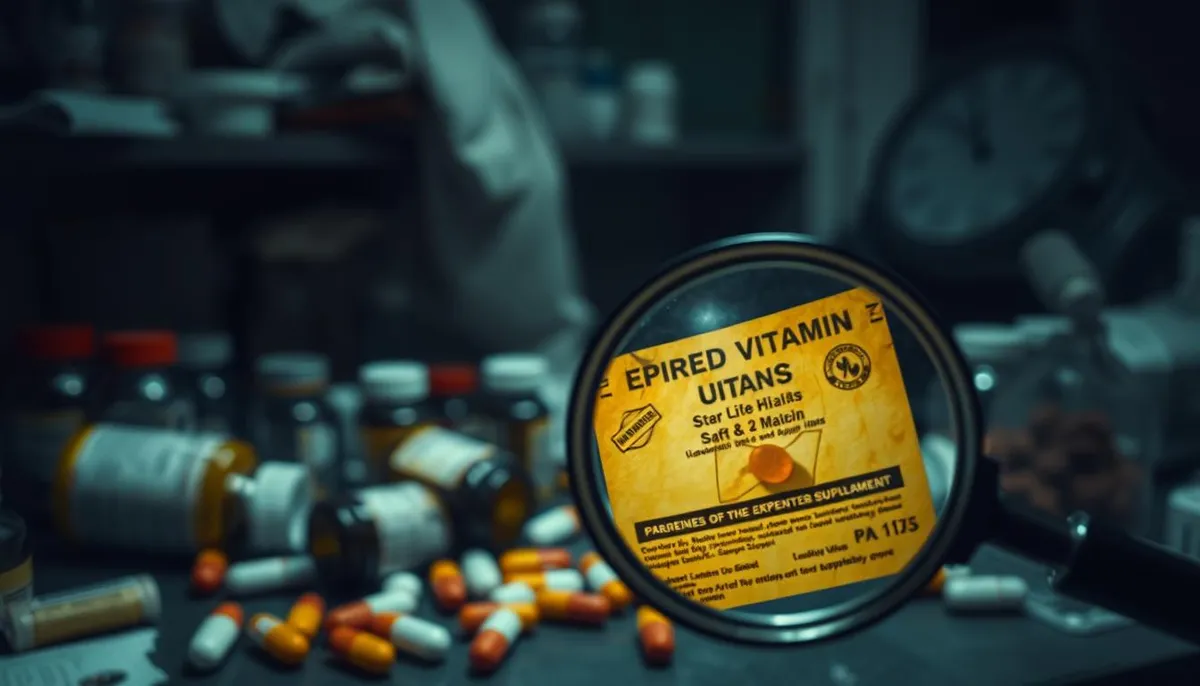Welcome to a question many health-conscious individuals ponder: what happens when your nutritional products reach their suggested use date? Understanding product shelf life is essential for anyone serious about their wellness journey and longevity objectives.

While nutritional formulas don’t typically become hazardous after their expiration date, they do gradually lose their potency. This diminishing effectiveness can impact your health strategy without you even realizing it. The FDA doesn’t mandate expiration dates on these products, though many manufacturers voluntarily provide this information when supported by valid data.
At longevity-supplement.com, we embrace innovative health approaches inspired by pioneers like Blueprint Bryan Johnson. We believe premium, fresh nutritional products are fundamental for optimal health outcomes and maximizing your life’s potential.
This comprehensive guide will help you make informed decisions about product quality and storage practices. You’ll learn everything from the science behind potency loss to practical tips for maintaining your investment’s effectiveness.
Key Takeaways
- Nutritional products gradually lose potency over time, affecting their benefits
- The FDA doesn’t require expiration dates, but many companies provide them voluntarily
- Proper storage significantly impacts how long products maintain their effectiveness
- Fresh, high-quality products are essential for achieving optimal health results
- Understanding expiration helps maximize your wellness investment and longevity goals
- This guide provides practical strategies for maintaining product potency
Understanding Supplement Expiration and Shelf Life
Understanding product freshness is crucial for maximizing your health investment and wellness results. The numbers on your vitamin bottles represent more than just calendar dates.
What Expiration Dates Really Mean
The expiration date on nutritional products indicates the manufacturer’s guarantee of full potency. This is not a safety cutoff but rather a quality assurance marker.
Most vitamins maintain their shelf life for about two years from manufacture. The FDA doesn’t require these dates, but reputable companies provide them when supported by valid data.
Factors Influencing Supplement Potency
Several elements affect how long vitamins remain effective. The product form plays a significant role in stability over time.
Chewable and gummy varieties absorb more moisture than capsules or tablets. This makes them degrade faster. Traditional tablets often maintain potency for several years with proper storage.
| Vitamin Form | Typical Shelf Life | Stability Factors | Vulnerable Nutrients |
|---|---|---|---|
| Tablets/Capsules | 2+ years | Resistant to moisture | Standard degradation rate |
| Chewable/Gummy | 1-2 years | Moisture sensitive | Faster breakdown |
| Liquid Formulas | 1-1.5 years | Light and air exposure | Rapid potency loss |
Certain nutrients like vitamin C and B1 break down more quickly. Unopened products generally retain potency longer by avoiding moisture, light, and oxygen exposure.
The Science Behind Do Supplements Expire: Potency vs. Safety
The science behind vitamin expiration reveals a fascinating distinction between safety and effectiveness. Unlike spoiled food that can make you sick, nutritional products primarily lose their beneficial properties over time.

Research Findings on Vitamin Stability
Military-funded research uncovered that 90% of medications remained effective 15 years past their dates. This shows expiration markers are often conservative estimates.
A 2019 study confirmed that vitamins lose potency gradually. The rate depends on product form, storage conditions, and manufacturing quality. Certain nutrients like vitamin C break down faster than others.
FDA Guidelines and Industry Standards
The Food and Drug Administration doesn’t approve dietary supplements like medications. This makes third-party verification crucial for quality assurance.
Choosing products with USP Verified certification ensures they meet strict standards. These nutritional aids maintain their advertised potency when stored properly.
While expired vitamins are generally safe, they may not provide full nutritional support. Fresh, high-quality products deliver optimal results for your health journey.
How Storage Conditions Affect Expiration and Effectiveness
Many people overlook the importance of proper storage when it comes to maintaining vitamin potency over time. Where you choose to store vitamins significantly impacts their ability to deliver optimal benefits throughout their shelf life.
Environmental factors can dramatically accelerate nutrient degradation. The bathroom medicine cabinet—where most people store vitamins—is actually one of the worst possible locations due to heat and moisture from showers.
Best Practices for Keeping Supplements Fresh
Always keep nutritional products in their original containers in a cool, dry place. These containers are specifically designed to protect contents from environmental damage.
Choose storage locations like bedroom drawers or linen closets instead of kitchen or bathroom areas. Keep bottles tightly sealed after each use to prevent air exposure.
Some products like fish oil, probiotics, and vitamin E benefit from refrigeration. This extends their shelf life significantly compared to room temperature storage.
Impact of Heat, Light, and Moisture
Heat exposure breaks down vitamin compounds, reducing potency faster than expiration dates suggest. Cool storage is essential for maintaining effectiveness.
Light exposure, particularly sunlight, degrades nutrients through photodegradation. Vitamins A and D lose potency after prolonged light exposure.
Moisture causes different problems depending on product form. Humidity can make tablets break down and gummies become sticky or moldy.
| Storage Factor | Impact on Vitamins | Vulnerable Products | Prevention Method |
|---|---|---|---|
| Heat | Accelerates chemical breakdown | All forms, especially liquids | Cool, stable environment |
| Light | Photodegradation of nutrients | Vitamins A, D, B complex | Dark, opaque containers |
| Moisture | Clumping, mold growth | Gummies, chewables, powders | Airtight containers |
| Air Exposure | Oxidation reduces potency | Fish oils, vitamin E | Tight seals, minimal opening |
Proper storage practices ensure your nutritional investment maintains maximum effectiveness. Simple changes in where you store vitamins can make a significant difference in their longevity.
Evaluating the Safety of Taking Expired Supplements
When facing bottles with dates that have passed, consumers naturally question the safety aspect. The good news is that taking expired vitamins is generally considered safe for most individuals.

There are no documented cases of illness or death resulting from consuming nutritional products past their dates. The primary concern isn’t safety but effectiveness.
Potential Side Effects and Risks
The main risk of taking expired vitamins is receiving reduced nutritional support. Products gradually lose potency, potentially creating nutritional gaps.
Most people experience no adverse effects from consuming dated products. However, you should immediately discard any items showing mold, unusual odors, or texture changes.
When to Avoid Using Expired Vitamins
Certain individuals should avoid taking expired vitamins entirely. Pregnant women or those trying to conceive need fresh prenatal formulas for proper fetal development.
People with absorption issues, existing deficiencies, or specific medical conditions should always use fresh products. Their health depends on reliable nutritional support.
If you’re generally healthy and accidentally consume an expired vitamin, don’t worry. But if you rely on specific nutritional support, invest in fresh replacements for optimal results.
Guidelines for Properly Disposing of Expired Supplements
Knowing how to safely get rid of aging health products protects both your household and the environment. Proper disposal prevents accidental ingestion and keeps our water systems clean.
The FDA recommends returning unwanted nutritional items to take-back locations. Many pharmacies and community centers offer these programs through drop-off or mail-in options.
Safe Disposal Methods
When take-back programs aren’t available, you can safely dispose expired vitamins at home. Mix them with dry materials like coffee grounds or cat litter.
Place the mixture in a sealed plastic bag before trash disposal. This makes products unattractive to children and pets who might find them.
Environmental and Household Considerations
Never flush vitamins down toilets or drains. They can contaminate water supplies and harm aquatic life.
Families with young children or pets should be especially careful. Colorful gummy formulas might look like candy to little ones.
Check online for local hazardous waste centers or community collection days. Proper disposal shows responsibility toward your family and community.
Enhancing Your Longevity Journey with Fresh, Quality Supplements
The pursuit of longevity requires more than just routine vitamin intake—it demands strategic investment in verified quality. Your health journey deserves nutritional products that maintain potency and deliver consistent results.
Choosing Premium, Tested Supplements
Independent third-party testing separates exceptional vitamins supplements from ordinary ones. Look for verification labels like USP Verified certification from the United States Pharmacopeia.
These programs ensure dietary supplements contain exactly what their labels claim. They maintain advertised potency throughout their shelf life.
| Verification Program | Testing Focus | Quality Assurance | Consumer Benefit |
|---|---|---|---|
| USP Verified | Ingredient purity and potency | Manufacturing standards | Verified content accuracy |
| NSF Certified | Contaminant screening | Good Manufacturing Practices | Safety from impurities |
| ConsumerLab.com | Label claim verification | Independent analysis | Third-party confirmation |
Integrating Supplements into a Holistic Health Strategy
High-quality vitamin supplement choices work best within comprehensive wellness practices. Nutrition, exercise, sleep, and stress management create synergistic effects.
Blueprint Bryan Johnson’s innovative approach treats premium products as cornerstones of health optimization. This philosophy inspires longevity-supplement.com’s curated selection.
Explore our platform for cutting-edge insights and premium nutritional aids. Start your journey toward extended healthspan today by signing up for exclusive content.
Practical Tips for Maintaining Supplement Potency Over Time
Simple organizational habits can significantly extend the life and potency of your nutritional investments. Implementing smart routines from purchase to daily use ensures maximum effectiveness throughout your products’ shelf life.
Start by checking the expiration date before buying any vitamin supplement. This simple step guarantees you begin with maximum usable time. Always read labels carefully since storage needs vary significantly between different formulas.
Optimizing Storage Conditions at Home
Fish oil supplements require special attention due to their sensitivity to heat and oxidation. Some fish oil products benefit from refrigeration to prevent rancidity, while others should not go below 59°F.
The same applies to probiotics and other oil-based formulas. Capsules containing liquid or oil deteriorate faster than dry formulations. Proper temperature control maintains their potency for years.
Regularly Checking for Signs of Degradation
Organize your vitamins by expiration date with nearest dates in front. Write purchase dates on bottles and set quarterly reminders to inspect your supply. This proactive approach prevents using expired vitamin products.
Regularly check for color changes, unusual odors, or moisture inside containers. Tablets sticking together or softened capsules indicate degradation. These visual cues help you maintain optimal potency over time.
Investing a few minutes each month in proper storage and inspection pays dividends in health outcomes. Even premium products lose effectiveness without proper care, making these habits essential for serious wellness enthusiasts.
Conclusion
The true value of your health investment lies not just in what you take, but in how fresh and potent it remains. While expired products are generally safe, their diminishing effectiveness can undermine your wellness goals without noticeable warning signs.
Fresh, high-quality nutritional choices deliver optimal results for your longevity journey. Proper storage practices extend product life, but even the best care cannot stop natural potency decline over time. Regular review of your supply ensures you receive maximum nutritional benefits.
At longevity-supplement.com, we believe every quality decision contributes to your larger vision of vibrant health. Your commitment to fresh products today builds the foundation for tomorrow’s achievements. Start maximizing your life potential with informed choices about product quality and storage.
FAQ
What does the expiration date on my vitamins mean?
The expiration date on your vitamin supplement is the manufacturer’s guarantee of full potency and quality up to that point. After that date, the product may begin to lose its effectiveness, but it doesn’t necessarily become unsafe to take immediately.
Is it safe to take expired vitamins?
For most solid, dry vitamins like capsules and tablets, taking them shortly after the expiration date is generally considered safe. The primary concern is a loss of potency, not immediate harm. However, you should avoid expired fish oil or liquid products, as they can spoil and become rancid.
How long do vitamins last after the expiration date?
A> There’s no universal answer, as shelf life varies. Properly stored products might retain most of their potency for one to two years past the date. However, their quality declines over time, so it’s best to use them before the printed date for maximum benefit.
What are the side effects of taking expired supplements?
The most common “side effect” is simply getting no health benefit if the product has lost its potency. With expired fish oil supplements or other oils, you might experience stomach upset from rancidity. Always check for changes in color, smell, or texture before use.
How should I store my vitamins to maximize their life?
Keep your supplements in a cool, dry place away from direct light and heat. Avoid storing them in the bathroom or kitchen where humidity and temperature fluctuate. A pantry or a bedroom cupboard is often ideal for maintaining quality.
What is the best way to dispose of expired vitamins?
For safety and environmental reasons, don’t flush them. The FDA recommends mixing them with an unappealing substance like used coffee grounds or cat litter, sealing them in a bag, and placing them in the trash. Some communities also have medication take-back programs.
Do gummy vitamins expire faster than pills?
Yes, often they do. Gummy vitamins can be more susceptible to moisture and may have a shorter shelf life than traditional tablets or capsules. Always check the expiration date and store them properly to prevent them from becoming sticky or moldy.
RelatedRelated articles



